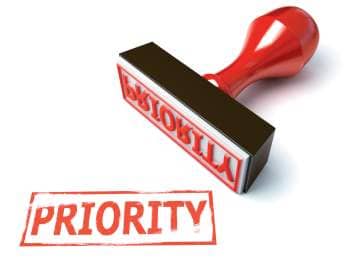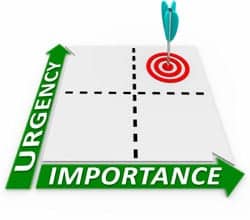
To create a balance between scheduled and emergency repairs, take small steps to organize and prioritize duties.
Alice Bloch once said, “We say we waste time, but that is impossible. We only waste ourselves.”1 Time is a major factor in our everyday lives as clinical engineers and biomedical equipment technicians. Time determines our experience in years, our preventive maintenance schedule in months, and our response time in minutes. Our performance is judged on how quickly we react to unplanned events and how loyal we remain to the scheduled ones. We are expected to remain vigilant and responsive to our repair calls, but also remain rigid and on time when it comes to our scheduled responsibilities. This balance of two extremely different demands can leave us feeling overwhelmed and lacking that one thing we need to make it all happen—more time.
How do we do it? How do we create a rhythm in such a responsive and volatile environment? The first thing we need to do is find a starting point and start now. Take small steps organizing, prioritizing, and managing our time. Time, like money, must be budgeted. As we budget our time, we will find more of it and we can reinvest it into our schedule, which in turn will result in the creation of more time. However, like money, if we are spending more time than we actually have, we will find ourselves stressed out, unable to complete all of our tasks, and feeling overwhelmed.
Getting Organized
In order to budget our time, we must first organize and prioritize our schedule. How do we organize all these events and prepare ourselves for unplanned ones? There are several tools available for tracking schedules and reminding us of upcoming events, but if they are not used properly, can they truly be effective? Determining what events we place in our schedule will determine how organized we are. Do we want our schedule as a reminder of commitments we have with others, or a daily plan to keep us on track?
Improving Productivity
A by-product of time management is not only reduced stress but also efficiency. How many times have you stopped what you are doing to answer the phone, a page, or an e-mail? And each time the flow of work is cut, it increases the time you need to refocus and finish a project.
As stated in this article, creating more time starts with planning and prioritizing tasks. Use this simple checklist to get started.
- Decide on a tool to help you track your schedule and remind you of upcoming events. Opt for an electronic or printed version.
- Determine what events to place in your schedule, such as reoccurring tasks, repairs, rounds, meetings, and one-time events. Include details, such as contact information or directions, to keep it efficient.
- Budget enough time to complete each task.
- Create templates of regular documentation needed; track part numbers, cost, and contacts to cut down on repeated research.
- Break down large projects into smaller tasks, and include a deadline for each task as well as the final project deadline.
- Prioritize events.
- Delegate, if possible.
- Ensure you have enough time allotted to complete all paperwork.
Taking the time to plan your day and by finding what system of organization works best for you will enable you to enjoy less stress and more productivity.
—SM
Events on our schedule can be a reoccurring task that requires an allotted daily time, such as checking e-mail in the morning, repairs, and rounds, or friendly reminders, such as anniversaries and birthdays. They can also include one-time events such as scheduled meetings and office visits. When scheduling events, we must first determine if this event requires preparation time and how much time we need to make the event beneficial. We must then input the information correctly and budget ourselves enough time to complete each task.
Reverse planning is an excellent way of identifying and organizing a project into our schedule. Start with the desired goal and plan in reverse, establishing steps to get to our goal. Events should be entered with details and the information necessary to make the event convenient and stress free, such as directions, locations, attendees, and, if required, equipment and supplies. Follow-up is often just as important as the actual event, so it should be part of a schedule as well.
Which is better—a paper schedule or an electronic one? Choose the one that works for you. Does your schedule change often? If so, a good pencil and daily planner may be the one to use. Several scheduling programs offer 15-minute reminders, which often either occur while we are in the middle of another task or when we are nowhere near our computers. It is an excellent practice to print out the schedule every morning so our scheduled events are easily viewed. Synching schedules to a remote device is equally handy.
Sometimes we perform the same task over and over within a week or even a day. We can create time by becoming more efficient in our repeated task. Creating templates for repeated documentation and mailing labels for repeated mail-outs, as well as saving all regular contacts, will cut down on administration time. Tracking part numbers, costs, and contacts cuts down on the amount of repeated research needed to complete a task. The more organized we are, the less time we will waste. Large projects should be broken down into smaller tasks. When dividing projects into smaller tasks, each task should have a deadline and every project should have a final deadline. The best way of assigning deadlines and tasks is by reverse planning, which means starting at the desired outcome and planning in reverse to get to that point using different mile markers.
Prioritizing Tasks
Now that we have our time organized, what project or job comes first? How do we prioritize? When scheduling, we must be able to prioritize our ev ents. We must determine our goals and then prioritize the events to accomplish these goals. Some events are considered “rocks.” These events are required, sometimes urgent matters. Urgent matters have a rigid time frame and are necessary to the accomplishment of a larger task. These events should be scheduled first.

Properly managing schedules involves assessing the urgency and importance of tasks, especially last-minute repair requests.
Tentative items, which are important but not urgent, should be scheduled next. Finally, allot time for weekly events such as meetings or running backups and daily tasks such as checking e-mail. Running reports and departmental rounds should be scheduled after weekly events. When we have conflicting events, the highest priority should take precedence. However, the other event should be immediately delegated or rescheduled. What happens when we have more tasks than we have time? We do not always need to do everything ourselves. If we are in a position where we can delegate a task, we can accomplish all of our desired goals without actually having to do them all ourselves. Delegation is a strong tool and can be used to allow an individual in a leadership position to control the scheduling and progress of an event without conducting the actual event themselves. However, scheduling the preparation and follow-up is still important to ensure the event occurs as desired.
Did our pager go off while we were planning our schedule? If it did, what did we do? Did we schedule a check of that emergency laser in the OR tomorrow? No, we did what we always do—dropped everything and responded. How can a schedule exist if it is constantly broken to respond to our customers? It is simple—prioritize. Is this an emergency call that cannot wait? If so, we can respond and reschedule what we are doing. If what we are doing is more important, than the page can wait until it takes the place of something less important.
Execution and Management
Now that we have organized and prioritized our schedules, it is time to execute our schedules and manage them properly. First, we need to set aside enough time for each task. How do we know how much time to budget? Allotting enough time to complete each task correctly is very important. When beginning to budget our time, we should allow for extra time. If we find ourselves needing more time or less time to complete a task, we can readjust for future events, just as we would with our financial budget. Be sure to assign paperwork and administration time to each event, since we are all aware that the paperwork left unattended can snowball into a project in itself.

There are several tools available to help track schedules and provide reminders of upcoming events, but they must be used properly to be effective.
Remember, we must preserve a healthy stress level. Healthy stress means not having so much stress that we feel run down and stressed, but also not so little that we feel unchallenged and unmotivated. We most try to dot all our “I”s and cross all our “T”s when completing tasks, and this includes documentation. Taking time to update paperwork and document our work is extremely important. Creating a “done today list,” either in a notebook or on that printed calendar, allows us to track our day and ensure we claim our time and close out our work orders. This time should be scheduled close to the end of our day. Nothing takes the place of updating our work orders as we go, but sometimes that is not an option. Taking time at the end of the day is a great way to double-check our work orders and documentation. We need to take credit for all of the great work that we do.
As the quote, often attributed to John Lennon, says, “Time you enjoy wasting, was not wasted.”2 Throughout this article I have been very careful to use “we” and “our” as we walked through a few ideas for time management. However, the true key to time management is “you.” You must have the desire and discipline to tame your schedule. Schedules are never one size fits all. You must find what works best for you in helping you control your time and keep it from controlling you.
Shawn E. Molloy, a BMET II, started his career as a biomedical equipment technician for the US Army in 1999. After 12 years with the US Army, he joined the clinical engineering department at Edward Hospital and Health Services, Naperville Ill, in early 2011. For more information, contact .
References
- Bloch A. Thinkexist.com. thinkexist.com/quotes/alice_bloch. Accessed Feb 10, 2012.
- Lennon J. Thinkexist.com. thinkexist.com/quotation/time_you_enjoy_wasting-was_not_wasted/210368.html. Accessed Feb 10, 2012. Possible authors: quoteinvestigator.com/2010/06/11/time-you-enjoy. Accessed Feb 10, 2012.





